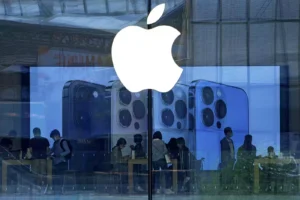The developers allege that Apple’s control over the distribution of apps on iOS devices amounts to a monopoly. The lawsuit highlights several contentious practices, including:
By Sam Watt | Dec 05, 2024 Updated 10:03 a.m. ET
A group of British app developers has filed a lawsuit against Apple in the UK, accusing the tech giant of abusing its dominant position in the app market to enforce restrictive policies and excessive fees on its App Store platform. The lawsuit, filed in the UK Competition Appeal Tribunal, is the latest in a series of global challenges to Apple’s App Store practices, which critics claim stifle competition and innovation.
Key Allegations in the Lawsuit
The developers allege that Apple’s control over the distribution of apps on iOS devices amounts to a monopoly. The lawsuit highlights several contentious practices, including:
- Mandatory Use of Apple’s Payment System: Developers are required to use Apple’s in-app payment system for digital goods and services, which includes fees of up to 30% for every transaction.
- Restrictive Terms: Developers claim they are bound by onerous terms and conditions that limit their ability to offer alternative payment methods or promote competing services outside of Apple’s ecosystem.
- High Fees: The so-called “Apple Tax” has been a long-standing point of contention. Developers argue that the fees are disproportionate and reduce their ability to reinvest in their apps.
The lawsuit alleges that these practices harm developers and consumers by reducing competition, inflating prices, and limiting consumer choice.
Who is Leading the Charge?
The case has been brought forward by several small and medium-sized app developers based in the UK. Among them are companies offering various apps, from fitness and education to gaming and productivity. These developers argue that Apple’s practices have put them at a significant disadvantage compared to larger companies that can absorb the fees more easily.
The claim is supported by Hausfeld, a law firm specializing in antitrust litigation, and the Coalition for App Fairness (CAF), a global advocacy group of developers pushing for regulatory changes in app marketplaces.
Legal and Regulatory Context
The lawsuit comes amid increasing global scrutiny of Apple’s App Store practices:
- EU Investigations: The European Commission has launched investigations into Apple’s practices, particularly focusing on competition issues with music streaming and e-books.
- US Antitrust Cases: Apple faces lawsuits in the United States, including a high-profile case brought by Epic Games over similar concerns.
- South Korea and Japan: Both countries have implemented regulations requiring Apple to allow alternative payment methods on its platforms.
In the UK, this lawsuit leverages the country’s robust antitrust laws to challenge Apple’s dominance in the app marketplace.
Apple’s Defense
Apple has consistently defended its App Store policies, stating that they are designed to ensure safety, privacy, and a high-quality user experience. The company argues that its fees are justified by the significant investments it makes in maintaining the App Store infrastructure and providing developers with tools, distribution, and global reach.
An Apple spokesperson responded to the lawsuit, saying:
“The App Store is a platform of opportunity for developers, offering a safe and trusted environment to reach millions of users globally. We will review the claims and are committed to defending our practices.”
Implications for the Industry
The outcome of this lawsuit could have significant ramifications for Apple and the broader app development ecosystem. A ruling against Apple could force the company to revise its App Store policies, potentially allowing alternative payment systems and reducing fees for developers. This could pave the way for similar legal actions in other jurisdictions.
For developers, the case highlights the growing movement for fairer terms and greater independence in the app marketplace. Smaller developers, in particular, stand to benefit from reduced fees and more flexible distribution channels.
Market Reaction
The lawsuit has already caught the attention of investors and market analysts. Shares of Apple (NASDAQ: AAPL) dipped slightly following the announcement, reflecting concerns about the potential financial impact of regulatory and legal challenges. The App Store, a key component of Apple’s services division, contributes significantly to the company’s revenue, generating an estimated $85 billion in 2022 alone.
Tech stocks overall showed mixed performance, with companies like Alphabet and Microsoft trading flat amid ongoing regulatory scrutiny of major tech platforms.
The lawsuit filed by British app developers against Apple underscores the intensifying global debate over the dominance of major tech platforms. As legal and regulatory challenges mount, Apple faces increasing pressure to adapt its App Store practices to meet the demands of developers and regulators. The outcome of this case will likely be closely watched, not only in the UK but also in jurisdictions worldwide where similar concerns about app marketplace monopolies persist.












Be First to Comment